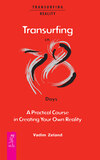Kitabı oku: «Reality Transurfing: steps 1-5», sayfa 11
From Battle to Balance
You may wonder if there is a way of counteracting the action of balanced forces. In fact our day to day life is an ongoing battle with balanced forces. All the difficulties and problems we encounter are linked with the actions of balanced forces. Trying to resist balanced forces is futile as they will have their way no matter what. Any effort to avoid the consequences of their actions will only aggravate the situation. The only remedy for the impact of balanced forces is to reduce the excess potential of importance produced as a result of the underlying problem. The kind of situations life throws at us are so diverse it would be impossible to give a universal recipe to cover all of them. There are however, certain general recommendations that can be made to ease the way.
People spend a lot of time building walls based on a foundation of importance only to bang their heads against it or try crawling under it. Rather than trying to get over the obstacle would it not be better to remove bricks from the foundation so that it crumbled? People tend to have a very clear view of the obstacles in their way but a very dim view of the foundation the obstacles are constructed on. If you find yourself in a problematic situation try and determine where you might have placed too much intensity, gone too far, or become obsessive, consequently projecting excess importance. Determine the meaning something has for you and then let go of it. The wall will crumble, obstacles will disappear and problems will be resolved of their own accord. Do not try to overcome obstacles; reduce their level of importance.
Reducing importance does not mean fighting your feelings or trying to suppress them. Excessive emotions and worries are the direct consequence of projected importance. It is the cause that has to be dealt with, and the cause is your relationship to whatever the event or other object happens to be. I could advise you to take a philosophical stance in life as far as this is possible, although this approach has already been milked for all its worth. You have to make conscious the fact that projecting importance onto things will bring you nothing but trouble and with that understanding, intentionally reduce the importance you attribute to things.
Reducing outer importance has nothing to do with neglecting one’s responsibilities or underestimating what is happening around you. On the contrary, neglect is the flip side of the coin where projected importance is concerned. There is a need to live simply, which includes maintaining a common sense attitude towards life. There is no place for carelessness or exaggeration. Rather than thinking so much about whether a person is good or bad, try to accept the limits of life.
Neither does reducing inner importance have anything in common with becoming resigned or putting yourself down. Indulgently repenting one’s sins and mistakes in life is the same as showing off one’s virtues and accomplishments. The only difference lies in the value sign each type of behaviour carries, be it positive or negative. Your remorse is only of any use to pendulums that want to establish control over you. Accept yourself the way you are. Allow yourself the luxury of being you. Neither exalt nor belittle your own virtues and flaws. Strive for a state of inner peace in which you understand that you are neither important nor totally insignificant.
If your situation very strongly depends on the outcome of a certain event try to find an alternative solution. In order to stay calm when walking along a plank you have to have a safety net. In each individual case, the safety net will be something different. Simply ask yourself what might serve as a safety net in a given situation and remember that it is useless battling against balanced forces. Neither should you try to suppress fear or excitement. You can only reduce the level of importance you have projected onto something and this can only be done if you have a safety net of some kind or a plan B. Never put all your eggs in one basket, no matter how safe the basket looks. The only thing that does not create excess potential is a sense of humour, the ability to laugh at yourself and others without causing offense. This alone is enough to stop you from becoming a kind of walking talking manikin. Humour deflates the intensity of importance.
When trying to solve a problem follow one golden rule: before you even start considering where the solution might lie, first reduce the level of importance you associate with the problem. That way balanced forces will not get in the way and the problem can be solved quickly and easily.
In order to reduce importance, first remember and be aware that the problem or situation has arisen as a consequence of projected excessive importance. Until you can explain to yourself that every single problem is created by excessive importance, you will continue to bury yourself in its intensity, as in a dream, remaining completely under the power of the pendulum. Stop, shake off the delusion and recall what projected importance leads to. Then intentionally change your attitude to the situation in question. It is not difficult to do. You already know that attributing excessive meaning to something will only get in the way. The main difficulty is to remember quickly enough that you are playing out projections of inner and outer importance. You need the help of your Guardian, your inner witness who constantly keeps track of all of your inner values.
A person’s thoughts are gripped by the power of importance in the same way that muscles become tense. When something is bothering you the muscles in your back go into spasm. You do not notice the tension in these areas until you feel the pain it causes. If you had remembered in time and paid attention to your muscles you could have released the tension before it built up into spasm.
Try to catch yourself when you start attributing excess importance to some event you are preparing for. If the event is genuinely important to you, try not to blow it up out of all proportion. The best recipe for success is spontaneity, improvisation and a common sense attitude. Any preparation should be by way of creating a safety net, not by being intensely serious and over careful; this will only increase the level of importance you are attributing to the event. If you are worried about something and yet do nothing about it, this too magnifies the level of importance you give it. The excessive potential of importance dissipates with action. Do not think, act! If you cannot act then it is better not to think at all. Shift your attention to something else, and as far as possible, let go of the situation.
The highest level of efficiency in any action is achieved when a person manages to shift the focus of their attention from self and the end goal, to the process of performing the action. In this case the person is not “doing important work” nor is “the work itself important”. Excess potential is eliminated and balanced forces will not interfere. The action is completed dispassionately but in no way carelessly or light-heartedly. You might be wondering why one should have to take the focus of attention off the end goal. After all, how can you do your work if you are not thinking about the end goal? Understanding of the meaning of this less obvious and curious fact will become clearer on reading the next few chapters of this book.
Why is it that sometimes you can get really anxious about a certain event? You think about it all the time imagining all kinds of things that could go wrong but in the end everything goes smoothly and so much better than expected? Other times the opposite happens. You are not particularly worried about a particular event which turns out to have completely unforeseen complications and unpleasant sides to it. In the first case, the personal assessment of the situation is off the charts negative whilst in the second case it is through the roof positive. What actually happens in the end is a result of the impact of balanced forces which have the function of balancing the excess potential created by the individual.
From this one might assume that a student, who intentionally pictures the worst possible scenarios immediately before an exam, is more likely to get a high grade. It does not work that way unfortunately because any intention that originates in the mind and not the soul lacks sincerity. You can try deceiving yourself but false sincerity has no energy behind it. Only an intention that comes from the soul has juice to it. This is why it does not work when you try to create a desired result simply via visualization, but this is a topic for later.
Never under any circumstances should you boast about what you have, even if you deserve those things and received them fairly, to say nothing of the things you have not yet achieved, because balanced forces will act against you.
Make yourself at home but do not forget that you are visiting. If you are in balance with surrounding pendulums, swaying with them in unison, your life will be pleasurable and flow with ease. When you are vibrating in resonant harmony with rest of the world it energizes you and you achieve your goals without any particular effort.
If you have driven yourself into a state where it is practically impossible to live in balance with the world around you (for example, your husband beats you), then you should think hard about how to take that crucial step to change your surroundings. If you feel that you have nowhere to go this is an idea that has been instilled in you by a pendulum that is trying to keep you under its control. There is always a way out, sometimes more than one. Remember that fly on the glass pane that did not spot the open window? Sudden movements that are badly thought out should be avoided. The best possible solution to any problem will come to you as soon as you reduce the level of importance you project onto it and free yourself from the influence of the destructive pendulum that prevents you from living in peace. You are already familiar with the two means of freeing yourself from a pendulum: defeat and stopping its sway.
With that thought I conclude this chapter on the complex and difficult theme of balance. Now that you understand how the mechanism of balanced forces works, you will easily be able to determine the reason for one failure or another. We conclude that it is essential to observe the principle of balance. It remains only to offer a word of caution against applying the principle too ardently, from becoming fixated with or fanatic about it, as this will only negate the very principle itself. If you try and explain to a centipede in minute detail how it should walk it will become so confused that it won’t be able to move at all. All things in moderation. Allow yourself from time to time to disturb the balance at little. Nothing awful will happen as long as you do not force the arrow off the scales.
Summary
Excess potential is only created when you attribute importance to your assessment.
Only the importance you personally attribute to something imbues your assessment with energy.
The force of the excess potential created, increases if your assessment represents a distortion of reality.
The impact of balanced forces is aimed at eliminating excess potential.
The action of balanced forces is often the opposite of the original intention that created the potential.
When renting yourself out, instruct your inner Guardian be help you remain impeccable.
Discontent and judgement will always turn balanced forces against you.
It is essential that habits of negative response be substituted with a transmission of positive energy.
Unconditional love is admiration without worship or the need to possess.
Setting conditions and making comparisons leads to dependent relationships.
Dependent relationships create excess potential.
Idealization and overestimation always end in disillusionment.
To experience reciprocal love you must let go of the right to possess.
You always have to pay for expressions of contempt and vanity.
Let go of the need to assert your superiority.
Striving to hide shortcomings creates the opposite effect.
Your positive qualities compensate for any inadequacies.
The greater the importance of your goal, the less likely you are to achieve it.
Desires are realized when they are free of excess potential created by projected importance and dependency.
Let go of feelings of guilt and the need to justify your actions.
To let go of guilt, it is enough to give yourself permission to be yourself.
No-one has the right to judge you. You have the right to be yourself.
Money comes of its own accord as an attribute on the path to your goal.
Greet money with love and attentiveness and part with it without regret.
Having let go of inner and outer importance you acquire freedom of choice.
The projection of importance is the only obstacle on the way to fulfilling your desires.
Do not try to overcome obstacles; reduce the amount of importance you project onto them.
Take care without worrying.
Chapter V. The Induced Transition
Do Not Absorb Negative Information

The Generation Shift
People have always hankered after “the good old days”. With age life somehow seems to get worse. People turn to reminiscing about their youth and times when the colours were richer, first impressions more vivid, dreams attainable, music was better, the climate more favourable, people were more approachable, and meat was more tender, to say nothing of their health. Life was full of hope, pleasure and joy. Once a certain number of years have passed, people begin to sense that events do not make them as happy as they did before. Picnics, parties, concerts, films, celebrations, dates, warm sea water…from an objective point of view all these things are still pretty much the same quality as they were before. Parties are still fun, films are still interesting and sea water still feels warm. Nonetheless, life is not the same as it used to be. The colours have faded, our responses have dulled and enthusiasm has waned.
Why is it that everything is so much more wonderful when we are younger? Can it really be that our perception of things loses its sharpness as we grow older? We do not lose the ability to laugh, cry, perceive taste and colour, distinguish truth from deceit or differentiate between good and bad just because we are a little older. So, could the world gradually be going downhill? No, the world is not deteriorating. Things only seem to be getting worse to certain people. What actually happens is that a person shifts to a negative life line that runs in parallel with former life lines where everything is just as fine now as it was before the individual left them behind. By expressing dissatisfaction a person attunes themselves to life lines that draw them in and where things genuinely are ‘worse’ than before.
According to the principle of Transurfing, the alternatives space has everything for everybody. In one sector, the colours of life have become grey, while another life remains as bright and cheery as it always was. A person who emanates negative thought energy ends up drawn into a sector with a different type of scenery but the world remains the same for everyone else. This is true not only in extreme cases in which someone has become an invalid, lost their home, their loved ones or become an alcoholic and ruined their life. In most cases, during the course of their life a person regularly slides onto life lines where the colours of the scenery are duller than they were on the previous life line. When this happens a person begins to reminisce about how vivid and fresh everything was years ago.
When a child is born they accept the world the way it is. A child is unaware of the fact that life could change becoming better or worse. Young people have not yet been spoiled and so they are less picky. They are still busy with the task of discovering the world for themselves and enjoying life because they have more hope than cause for complaint. They think that life is pretty much ok and expect it to get even better. With time they experience misfortune and failure and begin to understand that not all dreams come true; that some people are better off and that they have to fight for their place in the sun. As time goes by, they can end up with more cause for complaint than hope. Discontentment and whining become a moving force that pushes a person onto unsuccessful life lines. Expressed in Transurfing terms, this type of person radiates negative energy, which transfers them onto life lines that correspond to the negative parameters of their own thought energy.
Life is less satisfactory the worse you think it to be. Children rarely contemplate whether their childhood is good or not. As children we take everything for granted. We have only just begun discovering the world and have not yet acquired the habit of criticism. The greatest insult we experience as children is not being bought a much wanted toy by a relative. It is only as we get a little older that we start to resent the world around us for fulfilling us less and less. The more we complain the worse things are as a result. Everyone who has survived their youth and reached a mature age will say that a lot of things were better when they were younger.
That is the paradox: you come up against circumstances that disappoint you and so you express your dissatisfaction which then aggravates the situation even more. Your discontent comes back to you like a triple force boomerang. Firstly, the excess potential created by your discontent turns balanced forces against you. Secondly, your discontent serves as a channel through which a pendulum being can draw on your energy. Thirdly, radiating negative energy, you shift onto life lines of a corresponding vibration.
The habit of reacting negatively is so deep-seated that human beings are beginning to lose their advantage over other creatures further down the food chain in their capacity for awareness. An oyster also reacts negatively to external irritants, but unlike the oyster, a human being is able to consciously and intentionally regulate their relationship with the external world. Nevertheless, most people do not use the benefit of awareness, instead responding aggressively to the slightest inconvenience. Aggression is mistakenly interpreted as strength but in fact a person who chooses to express themselves aggressively might as well, metaphorically speaking, be quivering helplessly in a pendulum’s web.
You might think that life is not as good as it used to be but the younger generation happens to think that life is wonderful. Maybe they just do not know how great things were, when you were their age. Having said that, when you were young, the older generation complained about life too and reminisced about the good old days. This pattern cannot simply be explained by the tendency of the human psyche to erase all negative memories leaving just the positive ones. The criticism is aimed at the present moment which is supposedly worse than it used to be.
If you accept the fact that life is getting worse with every passing year then you would have to agree that the world should have simply fallen to pieces a long time ago. An uncountable number of generations have passed since the beginning of human history and each one believes that life’s colours have faded. Many an old man will tell you with absolute certainty how much better Coca-Cola used to be. Coca-Cola was invented in 1886. Imagine how disgusting coke must be by now if it has been consistently worsening in quality since then! Or perhaps one’s sense of taste weakens with age, although that is hardly the case. Anyway, the old man will probably tell you how everything else is of a poorer quality today too, be it furniture, clothes or any other item.
If the world were the same for everyone, after several dozen generations life would have become a nightmare for everybody. So how should we understand the paradoxical statement that the world is not the same for everyone? We all live in the same world comprised of the material realization of alternative life lines and yet every individual experiences a different possible alternative. On the surface of things there are obvious differences in people’s fate. Some are rich, some are poor; some are successful and some are struggling; some are lucky and some unlucky. We all have our own personal reality within the common world we live in. It seems quite straightforward, just as there are rich and poor neighbourhoods in a single town.
The script, role and the scenery differ in different manifestations of reality. The difference in scenery is harder to track. One person looks at the world from the window of their luxurious car whilst another peeks at it from inside a rubbish container. One person enjoys the party whilst another is consumed in thought about their problems. One sees a group of happy youths, another at a gang of hooligans. They are all looking at the same things but the images they perceive differ as black and white film differs from colour. Every individual is attuned to their own sector in the alternatives space and so everyone lives in their own personal world. All these worlds exist in layers that exist one on top of the other forming what we understand to be the space we live in.
It might be difficult to imagine but no one layer can be separated from another. Every individual creates their own reality and that reality intersects and interacts with the rest of the world around us.
Imagine what the Earth was like before any single living creature existed. Winds blow, rains fall, volcanoes erupt and rivers flow. Then suddenly a person is born who begins to observe their environment. The energy of that person’s thoughts stimulates the material manifestation of a certain sector of the alternatives space which represents their specific life in this specific world. That person’s life represents a new layer in the world. Then another person is born who generates another layer. One person dies and a layer disappears, or perhaps is transformed depending on what happens beyond the threshold of death.
We are vaguely aware that other forms of life exist in parallel worlds of some kind. Let us suppose for a moment that there are no living creatures in these worlds whatsoever, at least not yet. What kind of energy would stimulate the material manifestation of space that contained no single living creature? We can only guess. Perhaps, once the last living creature dies, the world itself will disappear? Who can prove that the world exists if there is nobody in it? For if there are no people who would be around to say that the world (in our understanding) exists at all. There would be no world to speak of.
That is enough speculation for now. We do not want to get bogged down in abstract conjecture. Remember though, that Transurfing is just one of many models. All existing theories about the world and life in it are nothing but models. Remember also the notion of importance and try to avoid projecting any outer importance onto the Transurfing model of the universe; otherwise you could become an apologist for futile ideas and try proving to everyone the truth of your own subjective worldview. Truth is an abstract notion for we can only understand some of the world’s forms and laws. Our goal here lies exclusively in attaining maximum practical benefit from our preferred model of the universe.
Now let us return to the topic of the generations. Throughout their lifetime a person re-attunes their energy from the vibration of one sector in the alternatives space to another, thereby transforming the layer of their personal world. The more a person readily expresses their discontent emanating large quantities of negative energy, the more strongly the tendency for the quality of their life to deteriorate is consolidated. A man could acquire great material wealth with age but not necessarily be any the happier for it. The colours of his scenery could just as well fade and life become less enjoyable. The older and the younger generation both drink the same Coca-Cola, swim in the same oceans, ski on the same mountain slopes and everything is pretty much the same as it was many years ago. However, the older man is convinced that in his day everything was better and the young person is convinced that things are better now and when the young person grows old the story will no doubt repeat itself.
There are deviations from this tendency, both for the better and for the worse. Sometimes a person only begins to develop a taste for life as they get older, and the opposite can happen; a successful young man can go downhill until he hits rock bottom. That said, in general, the generations agree that life gets worse as you get older. This is how the shift in generational layers takes place. The layer of the older generation shifts to a life line of poorer quality and the layer of the younger generation gradually follows on behind. The shift takes place gradually, each time starting from a point of optimism. This is precisely why the world as a whole never actually transforms into a living hell. Everyone has their own layer, which they choose themselves. By now you will have a clear picture of how the choice can be made to one’s personal detriment.
In previous chapters we have already talked about how to avoid creating a living hell in your own life layer. You may also wonder whether it is possible for a person to retrieve an earlier section of their world, or return to a life line that was filled with colour and hope like it was in childhood. The Transurfing technique can help with this task but before we look at that it is first useful to understand how exactly a person can end up shifting from a life line full of success and hope to a life line where they would face the question: “So how exactly did your life end up like this?”












